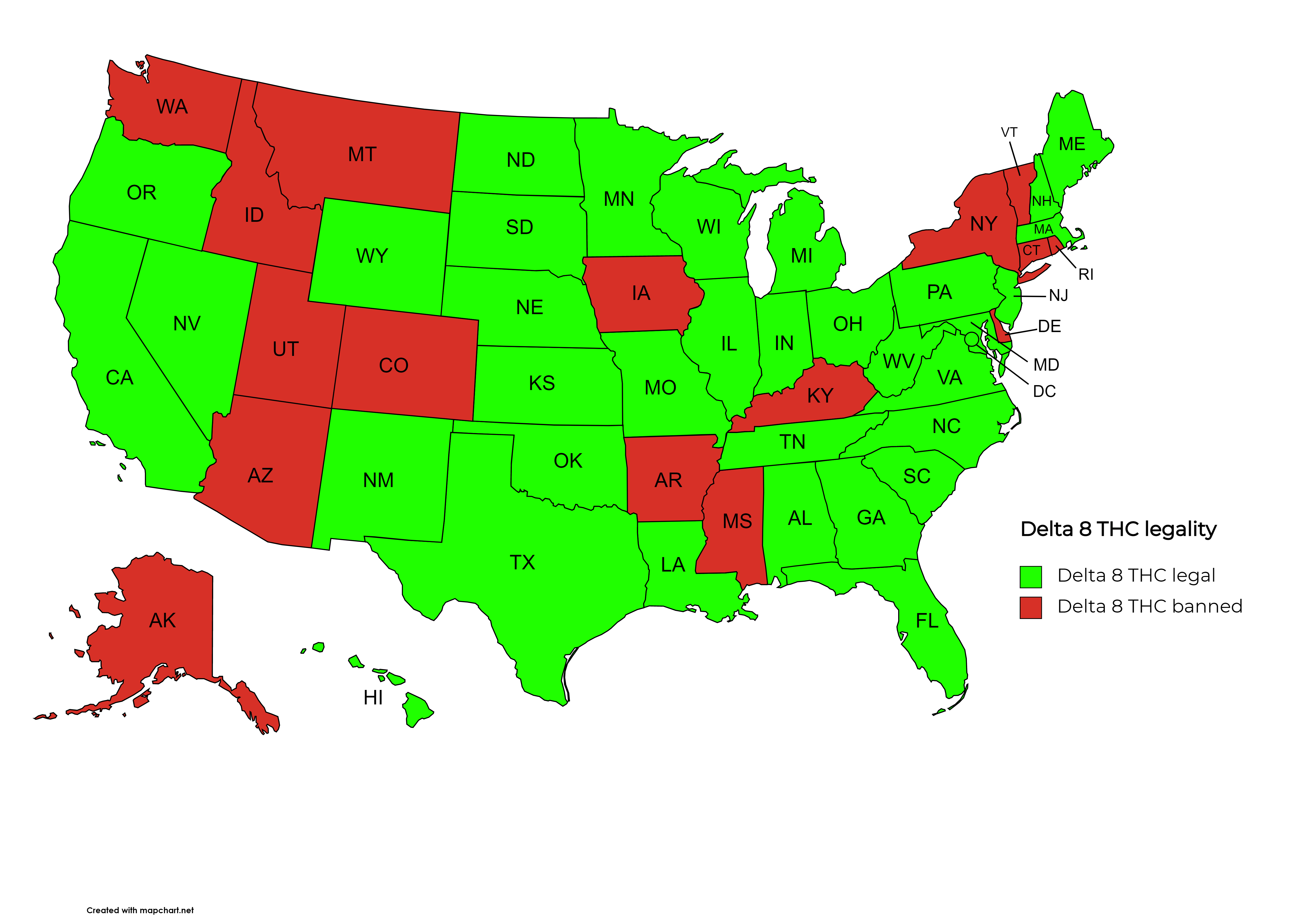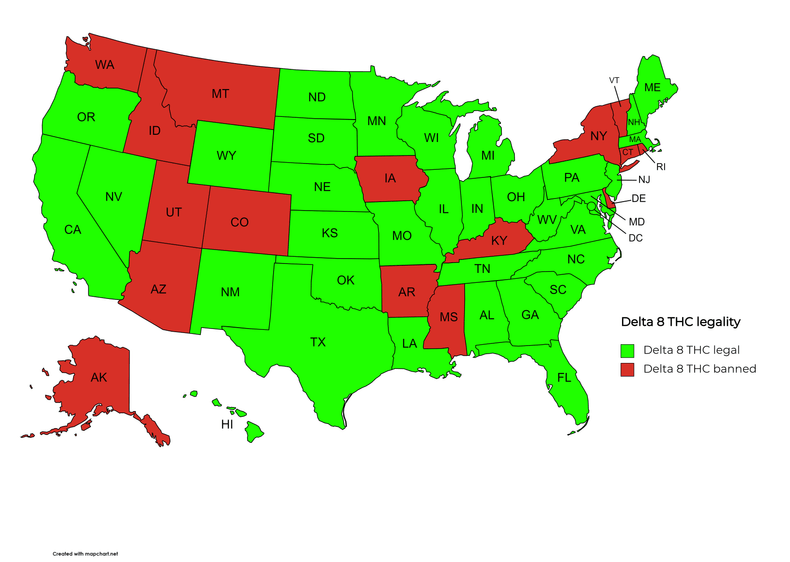
Is Delta-8-THC Legal?
In short, yes hemp derived delta-8-THC is legal at the federal level. However, the full answer is a bit more complicated. Some states have more restrictive laws regarding delta-8-THC and some states have legalized marijuana and sell delta-8-THC derived from the federally illegal plant (Delta-9-THC>.3% by dry weight). Only delta-8-THC derived from hemp is federally legal.
Hemp has a long history of industrial use in the United States, many colonies even mandated farms to grow hemp as a staple crop. Being commonplace at the time, George Washington and many other founding fathers grew hemp. Although legal for most of U.S. history, hemp production was outlawed from 1937-2018.
Shortly after Prohibitionists failed to keep alcohol federally illegal, marijuana was effectively banned in 1937. The chemical characteristics of hemp were poorly understood at the time, leading lawmakers to lump in hemp with marijuana.
In 2018 the Farm Bill was passed, once again legalizing and defining industrial hemp as:
"the plant Cannabis sativa L. and any part of that plant, including the seeds thereof and all derivatives, extracts, cannabinoids, isomers, acids, salts, and salts of isomers, whether growing or not, with a delta-9 tetrahydrocannabinol concentration of not more than 0.3 percent on a dry weight basis."
As you can see, the provision also legalized isomers of hemp plants. Delta-8-THC is isomerized from CBD in hemp, therefore falling into the legally protected category.
The Farm Bill also specified requirements for hemp farmers, requiring licensing, recordkeeping, procedures for THC testing and disposal of non-compliant plants. The Farm Bill contains other noteworthy provisions like protecting and extending hemp research. More importantly, the bill specified terms to allow for large scale hemp cultivation and transport of hemp derived products across state lines. The regulatory program is to be coordinated between the USDA and state governments, or at a federal level if left unregulated by states. After research and coordination, the USDA finalized regulations in March of 2021.
The USDA put careful safeguards in place for the production of hemp. Part of these regulations require the testing of hemp to ensure compliance with the less than .3% delta-9-THC requirement. The regulations also require a third party to collect a sample from the hemp’s flowering tops 30 days before harvest. Five Twenty hemp sends off all CBD and delta-8-THC products to be tested by third-party laboratories, certificates of analysis are available here.
Ok, Delta 8 is legal federally but is it legal in my state?
With the 2018 Farm Bill, CBD delta-8-THC and many other cannabinoids became legal at the federal level, when derived from hemp with less than .3% delta-9-THC by dry weight. However, states have created their own regulations on top of the federal laws, resulting in delta-8 THC being regulated differently in 14 states
Alaska: While recreational marijuana is Legal, Alaska classifies tetrahydrocannabinols, hashish, and delta-8-THC as schedule IIIa substances. Alaska does not allow the sale or manufacturing of hemp derived delta-8-THC in state.
Arizona: All naturally derived tetrahydrocannabinols are specifically banned from being manufactured, produced or sold in Arizona
Arkansas: Tetrahydrocannabinols and their isomers are considered Schedule VI substances; therefore, delta-8-THC is banned from being produced or distributed in state. Arkansas has explicitly legalized hemp derived CBD and non-intoxicating cannabinoid products from hemp.
Colorado: While recreational marijuana is legal in Colorado, delta-8-THC is specifically banned from being produced or isomerized from hemp. This confusing stance may be a reaction to the budding industry. The delta-8 THC ban may be in place in lieu of developing specific regulations for delta-8 THC production in the near future.
Connecticut: On July 1, 2021, delta-7, delta-8, delta-9, and delta-10 Tetrahydrocannabinols were banned from sale in concentrations over .3% by weight. While Connecticut allows the sale of these compounds by licensed cannabis retailers or medical dispensaries, no licenses have yet been issued
Delaware: The sale of delta-8-THC is prohibited in Delaware and is considered a controlled substance under Title 16 Health and Safety statutes
Kentucky: On March 25 2021 House Bill 307 declared all cannabis derivatives illegal, leading people to question the status of hemp products. On April 19 th, the Kentucky Department of Agriculture issued legal guidance to hemp producers stating that hemp derived delta-8 THC is included in the cannabis ban.
Idaho: In 2019 all hemp derived tetrahydrocannabinols with a concentration above .3 % were banned, including delta-8-THC
Iowa: While hemp and CBD from hemp are legal in Iowa, all tetrahydrocannabinols above a .3% concentration are restricted
Mississippi: The state legislature amended their Controlled Substances Act to allow for hemp and derivatives like CBD; however, tetrahydrocannabinols like delta-8 THC are still classified as Schedule I
Montana: Initiative 190 passed in the beginning of 2021 legalizing marijuana for personal and private use. However, Montana also classifies all tetrahydrocannabinols as Schedule I substances. These contradictory laws are likely to be ironed out in the near future, but, for now, delta-8 THC is technically illegal.
Rhode Island: Hemp and cannabis are lumped together in Title 21of their controlled substances act, which classifies all tetrahydrocannabinols as Schedule I substances. While there is an exception for hemp derived products, they cannot be intended for human consumption. Delta-8 THC is therefore not yet legal in Rhode Island
Utah: In 2018 hemp-derived CBD was legalized, however there has been no exception made to the controlled substances act for hemp derived tetrahydrocannabinols. Delta-8 THC is not legal in Utah.

